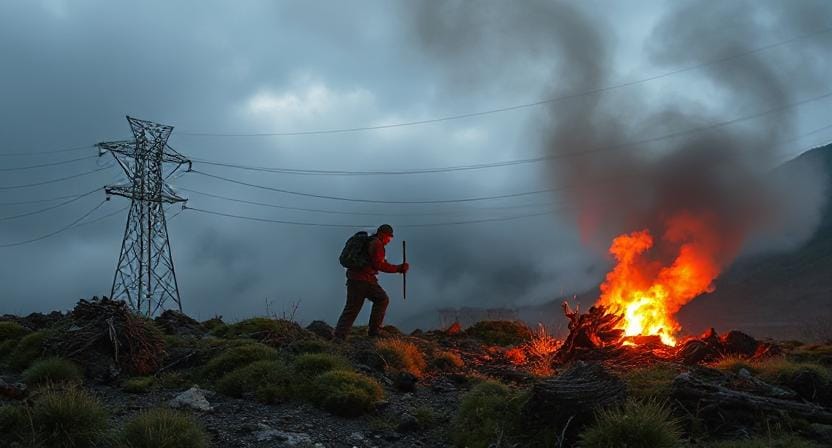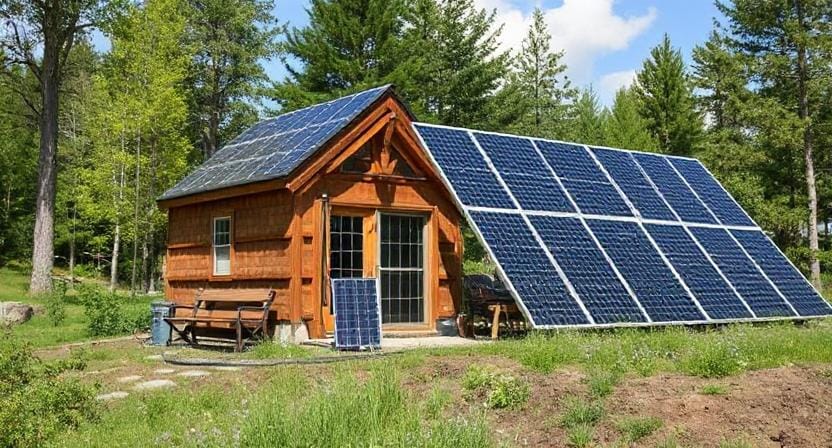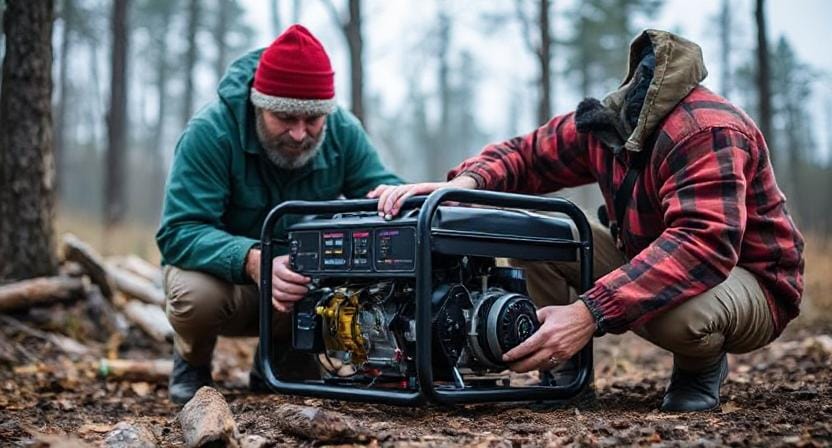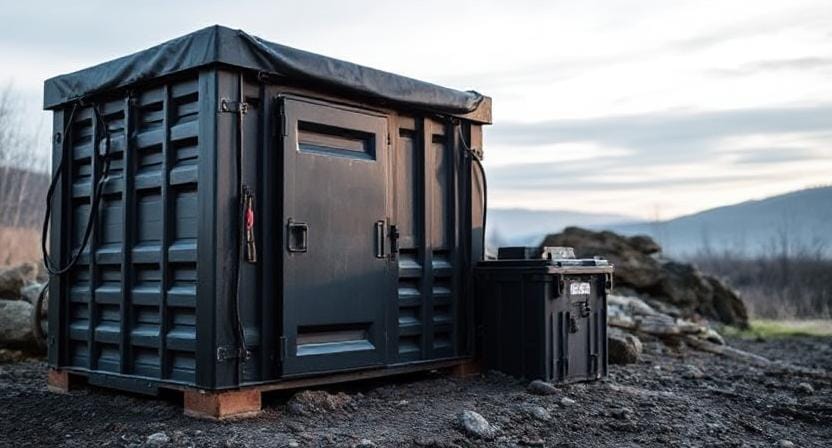Top Takeaways and Key Concepts
- Identify essential power needs first to avoid wasting energy during outages.
- Use portable solar panels and chargers to keep small devices powered without fuel.
- Choose the right generator and fuel type to maintain reliable backup electricity.
- Add battery storage systems to store renewable energy for nighttime or emergencies.
- Create a simple energy management plan to prioritize important devices and conserve power.
Summary of This Article
This article explains practical ways to stay powered during a blackout using a combination of backup tools and smart planning. It covers identifying essential energy needs, using generators and solar panels, and storing power in batteries for long-term reliability. It also highlights how energy management—like using smart plugs and conserving electricity—helps stretch your backup power. With preparation and the right tools, anyone can stay safe, comfortable, and confident during power outages.
Short Video Version of this Article
It certainly helps to have a strategy in a world where power can go out faster than your favorite snack. Power outages can happen at any time, as when the grid goes to sleep or during a severe storm. Knowing how to keep the lights on might make you feel comfortable and snug.
Please Note: This post may contain affiliate links. If you click one of them, we may receive a commission at no extra cost to you. As an Amazon Associate, I earn from qualifying purchases.
Take a moment to think. You don’t want to be in the dark, wondering where your flashlight is. I’ve been in that situation. Camping excursions might be fun, but what about when the power goes out at home? No, thank you! Getting ready can make a big impact.

Imagine you have a little electricity generator or some solar lights that are ready to use. It’s like having a superhero on your side! You don’t have to run around seeking for candles when the lights go out. You have everything ready, and it feels nice.
It’s not enough to just have power; you have to know how to use it. It’s also crucial to know how to use it correctly. Things work better if you don’t use all of your power at once. It’s like giving your pals some of your food instead of consuming them all at once. You know, that keeps everyone happy.
Every adventure teaches us something new, right? With some experience and planning, you can change everything. You’ll be able to handle any blackout like a pro, making sure your space stays peaceful and comfortable. That peace of mind is worth a lot, especially when things don’t go as planned!
Understanding Your Power Needs

Understanding what your power needs are is crucial. Have you ever considered how much electricity you actually use daily? It might surprise you! From lighting to charging devices, everything adds up quickly. Take some time to write down which appliances and gadgets are most important during an emergency.
For example, I once went camping without thinking about my phone charger. Let me tell you; it was a hassle trying to conserve battery life while also needing to stay connected!
Knowing what you really need before the lights go out can save a lot of stress later. Think about your essential items. Is it your fridge keeping those leftovers safe? Or your phone to call for help? Make a list. It feels good to be prepared.
How long do you think you’ll need power? Just a few hours of darkness might need less than a few days without light. Imagine sitting in the dark for days—yikes! Planning for longer outages helps you avoid that scary “uh-oh” feeling. You want to feel ready, not panicked.
Look around your space. Did you spot a cozy blanket, your favorite book, or even a mini fan? Those are essentials too. Consider having backup power for things that make your life easier. It might be a generator to keep the fridge running or solar chargers for phones.
When you think through all this stuff ahead of time, you really set yourself up for success. And you won’t feel like you’re fumbling around in the dark. That’s such a relief, right? You’ll have a smart plan and can calmly enjoy those snacks while waiting for the lights to come back.
Solar Power Solutions

Solar power is one of the finest choices for preppers. It’s quiet, renewable, and can be set up practically anyplace, making it great for both home use and outdoor adventures! I recall putting up a little solar panel at my campsite. It was fantastic to see how much electricity we could get from the sun every day.
Choose portable solar panels when you buy them. They’re great for outdoor activities or when you need to go in a hurry. Picture needing power and being able to get it and leave. Some great kits even come with batteries already in them. That implies you’ll still have energy left over when the sun goes down. That’s so great!
Also, don’t forget about those little solar chargers. They’re great for making sure your phone or flashlight is always ready to go. Very light and easy to carry on hikes or just hang out at a campsite. All you need is the sun—no outlets!
Imagine being outside and your phone is running low. You pull out your small solar charger, and voila! You’re back in business. It’s nice to know you can stay connected without having to plug in.
If you keep your gear charged, you’ll have more fun on your trip. It’s like having a little backup plan in your pocket. Think about all the enjoyable things you can do without worrying.
Generators: The Backup You Need

Another common choice for preppers who want to keep their homes powered during outages is a generator. They come in a range of sizes, from small, portable ones that are great for camping trips to bigger standby generators that can power whole homes.
To be honest, buying a reliable generator can save you a lot of trouble when the power goes out.
The sort of fuel you use is quite important when choosing a generator. There are a lot of gasoline generators out there, but they need some care and you need to consider about where you’ll keep the fuel. No one wants a garage that is a mess, right?
And then there’s propane. It’s wonderful that it lasts longer on the shelf. But you could need other items, like tanks. A little extra trouble, but sometimes it’s worth it.
Here’s a neat tip: certain generators can run on both gas and propane. Two choices! It lets you choose based on what you can find. If one runs out, you can swap to another. Very useful in protracted circumstances when resources could be low.
Imagine this: you’re at home, warm and snug, and the electricity goes out. You turn on your dual-fuel generator, and all of a sudden, you have heat and light. Feels really good, huh?
Being ready means you can rest a little since you know you’re ready for anything. And what about showing off your generator knowledge to your friends? Extra points!
Battery Storage Systems

More and more preppers are using battery storage devices to keep their power on without having to depend just on generators or solar panels.
These systems keep energy from renewable sources, like solar, so that it’s always ready to use when you need it.
I’ve seen some very fantastic configurations where folks combine enormous battery banks and solar panels together. It’s like magic! These systems may run everything from lights to fridges to coffee makers. Think about brewing coffee when you don’t have power. That’s what we all want, right?
A lot has changed in technology. We may now use energy from the sun to power our dwellings. Nature and technology working together. Pretty cool!
You should know that not all batteries are the same when you buy them. The new lithium-ion batteries live longer than the old lead-acid ones. It’s like having a hamster that lives forever instead of one that needs a lot of care all the time. But they do cost more at first.
But think about it: investing a little more now will save you trouble later. More dependable energy over time means more comfortable nights with the lights on and the fridge humming.
Do you feel a little overwhelmed? That’s OK. Just do it one step at a time. Picking the correct configuration may make a huge impact, and you’ll be so happy when you’re all set! Also, you’ll be ready for everything that happens in nature.
Creating an Energy Management Plan

Now that you’ve looked into numerous ways to get backup power, let’s speak about how to use that power wisely! An energy management strategy helps you decide what to use first based on the resources you have, and it makes sure that important things keep working even when the power goes out.
Adding smart plugs or timers to your house really changes the game. They let you decide when and how much power to employ. You are in charge of your electricity!
Picture this: you can run your washing machine while the sun is shining. That means you’ll be able to use all that fantastic solar energy while it’s there. Your battery will be glad too because it saves energy for when you truly need it, like at night. Isn’t that smart?
And let’s not forget about the small things we do. Turning off electronics you aren’t using can make a big difference. It’s crazy how those little things build up. Do you want to see your favorite show? When you’re done, just unplug the TV. No problem!
When you think about these things, you can save energy and keep your home warm when you need it most. It’s like giving energy conservation a little high-five. Also, it feels nice to be in charge! You can do this!
Conclusion: Stay Prepared
You know, it’s such a nice feeling to be ready for anything. It’s like having an umbrella in your backpack even when it’s sunny. If something goes wrong, like a storm or a power outage, you’ll be fine. Don’t worry.
Think about what you actually need. Do you want to keep your fridge running or just have enough lights to read? Knowing that helps you pick the best backup plans. There are a lot of cool choices! There are benefits to using solar panels, generators, and battery systems.
It’s not enough to just have things ready. It’s also about having faith in yourself. Life is a little simpler when you know you can handle unexpected. You’re making a small fortress of comfort around you.
Every little bit helps. Buy an additional flashlight or some candles, maybe. Ask your friends about their setups. You will all be ready for anything that comes your way. It’s like being on a superhero team and going on adventures together. You can do this!
Featured Snippet: Staying powered during a blackout is possible with the right planning and backup tools. By identifying essential power needs, using generators, solar panels, and battery systems, and creating a smart energy management plan, you can keep devices running, stay safe, and maintain comfort during outages.
Frequently Asked Questions
What should I power first during a blackout?
Start by powering essential items like lights, communication devices, refrigeration, and medical equipment while avoiding unnecessary energy use.
Are solar panels enough for emergency power?
Portable solar panels can keep small devices charged, but pairing them with a battery bank increases reliability during long outages.
What type of generator is best for home backup power?
A dual-fuel generator is ideal because it runs on gasoline or propane, giving you flexible fuel options in emergencies.
Why add a battery storage system?
Battery storage systems let you store energy from solar panels or generators so you have quiet, reliable power when fuel or sunlight runs low.
How do I know my power needs?
List the devices you must power during an outage and calculate their watt usage to size your backup system correctly.
How can I conserve power during an outage?
Turn off unused devices, use LED lighting, and run high-energy appliances only when necessary to extend your backup power.
Do I really need an energy management plan?
Yes, planning helps you prioritize energy use, prevent overload, and make your backup power last longer during extended outages.
Suggested Resources:
Solar Power Basics
https://www.energy.gov/articles/solar-power-basics
How To Choose a Generator
https://www.consumerreports.org/generators/how-to-choose-a-generator-a29558683/
Battery Storage Systems Explained
https://www.solarpowerworldonline.com/2021/01/battery-storage-systems-explained/

Kevin Collier is a seasoned outdoor enthusiast and writer for Trekbug.com, specializing in outdoor adventures, survival strategies, and prepping insights. With a deep love for nature and a commitment to self-sufficiency, Kevin empowers readers to embrace the wilderness confidently. He shares valuable tips, practical techniques, and inspiring stories, helping both novice and experienced adventurers develop essential skills for surviving and thriving in the great outdoors.





